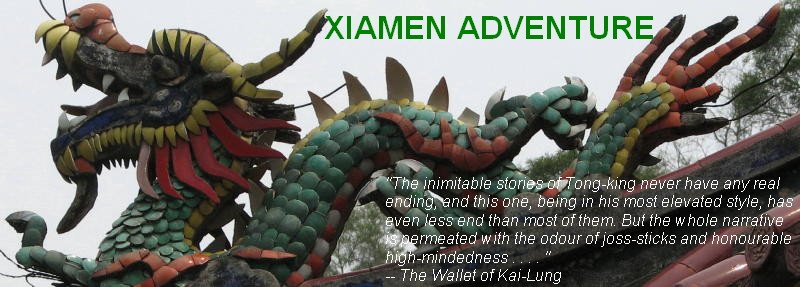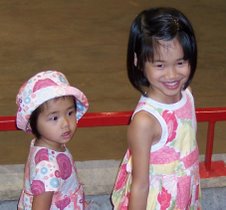 My classes have been fascinating for the last couple of weeks. In Constitutional Law, we have left behind the slightly dry “powers of government” material and are enmeshed in learning about constitutional guarantees of fundamental rights and individual liberties. It’s been illuminating to watch the students react to issues I know are controversial in China – premarital sex, gay and lesbian relationships, race relations, for instance. And it’s been particularly interesting to see some students espousing pretty liberal viewpoints on these issues. It seems that this new generation in China, like new generations everywhere, is rethinking some old ideas.
My classes have been fascinating for the last couple of weeks. In Constitutional Law, we have left behind the slightly dry “powers of government” material and are enmeshed in learning about constitutional guarantees of fundamental rights and individual liberties. It’s been illuminating to watch the students react to issues I know are controversial in China – premarital sex, gay and lesbian relationships, race relations, for instance. And it’s been particularly interesting to see some students espousing pretty liberal viewpoints on these issues. It seems that this new generation in China, like new generations everywhere, is rethinking some old ideas.Particularly noteworthy was the day we studied Loving v. Virginia, where the Supreme Court held that it was unconstitutional to ban inter-racial marriage because of a fundamental right to marry, and Lawrence v. Texas, where the Supreme Court held that it was unconstitutional to criminalize gay sex.
The discussion of racism was almost amusing, since China takes the firm position that there is no racial discrimination in China. That’s a pretty easy position to take when you have a mostly homogeneous society. But, I asked, how about the various minority groups in China. Would it be considered a problem if a Han (the majority ethnic group) were to marry a Miao (a minority group)? No, they said, most of the minority groups are so assimilated that there are few distinctions made any more.
I asked the students whether inter-racial marriage was considered a problem, and they assured me that it was not. I asked how their parents would react if they were to marry a Caucasian person. The men said this would be no problem, and as they were talking I could see the women laughing and whispering to themselves. So I asked them how their parents would react, and they said their parents would see it as a big problem. They would worry that the children were not Chinese, and would not be raised to understand Chinese values.
This led to a great discussion about what it meant to be Chinese – was ethnicity enough, or did you have to have language and culture as well? (I told them about Zoe wanting to be Chinese, but feeling she was not Chinese since she didn’t know the language.) They were familiar with the words “bamboo” (Chinese on the outside, but hollow of culture on the inside) and “banana” (yellow on the outside, but white on the inside) as describing overseas Chinese. And they said there’s an equivalent expression for people raised in China who are white on the outside but Chinese on the inside – they are “egg.” I asked if “egg” and “banana” were really equivalent – was “egg” a compliment or an insult, was “banana” a compliment or an insult? They admitted that “egg” was a positive description while “banana” had definite negative connotations. (Don’t worry, all of this was actually relevant to the legal discussion, too – we had to talk about what it took to be “colored” under the anti-miscegenation laws).
China has a long history of intolerance of gay men and lesbians, so I was curious to hear my students’ reaction to the Lawrence case. I said that it was my understanding that most Chinese considered homosexuality to be wrong, and that some in America also consider it to be wrong. I also said that many in America who consider it wrong will say it is because of their religion or because they feel the Bible condemns it. What were the reasons people considered it wrong in China? A student said it was because of tradition and “family values.” And, he said, it was not natural, which is proven by the fact that no animals have sex with members of the same sex. Another student jumped in to say that in fact there are animals that will have homosexual sex, citing studies of sheep, monkeys and insects (I admit I didn’t expect the students to be quite so current on the topic!).
Yet another student jumped into the discussion to say that gay people should not be allowed to parent children because that would make their children gay. Two students rapidly protested, saying that no one could be persuaded to be gay if they were not and that being gay was a matter of biology. Another student disagreed, saying that it was family life that made someone gay. He said that if a boy is raised with many sisters, he will like girlish things and become gay. I said, “Well, then, I guess there will be no more gay people in China since no one has brothers or sisters anymore!”
One student piped up pretty early on in the discussion to say – and I’ll try to get this as close to verbatim as I can – “I know some homosexuals and they are very nice boys. They work hard and have high standards. I don’t see this as a problem. They should be able to do what they want.” I admit I never expected to hear this attitude expressed in China.
Women & Law has been fascinating, too. Here, the students are definitely grappling with old ideas – their parents’ ideas. As my Con Law students’ disparate reaction to the question about inter-racial marriage illustrated, parents exert more control over daughters than sons (or at least they try to!) My women students tell me that their parents arrange dates for them, that parents who have daughters will fix them up through their friends who have sons. And, they said, they really must have their parents’ approval to get married, which is why they agree to these dates.
Several commented wistfully that it isn’t possible for women to choose to be single in China. There is too much family pressure to get married, and women are still expected to live with their parents until they marry. The only way to avoid living with your parents until you are married is to work far away from the family home. Still, you are expected to spend weekends and holidays at the family home. So, they said, you really can’t have your own home and your own family until you marry.
Now this was the kind of traditional Chinese attitude that I was expecting to encounter. But what seems new to me is that the women students are definitely chafing under these restrictions. What will be interesting to see in the coming years is whether young Chinese women will manage to break free.
One of the biggest barriers, it seems, is financial. The reason you need your parents’ approval to marry is that if they don’t agree, you won’t be able to get financial help from them in the future when you are trying to buy a house or pay for a child’s education. And there is very much the perception that a young couple cannot succeed without that financial support from a parent. And one reason women live at home while they are single is that they are often financially unable to support themselves, even with advanced degrees like my students are getting. They tell me it is very difficult for young women to get jobs; employers assume you will be marrying soon and having a baby, and they don’t want to have to pay your maternity leave. So, this new generation – China’s future – is struggling with old attitudes, old strictures, trying to make space for new attitudes. I really hope I can keep in touch with my students – it will be fascinating to see where they are, how their attitudes have changed China in, say, 10 . . . 25 . . . 50 years.







7 comments:
Do the employer attitudes sound familiar? It seems like I wasn't much younger than your students when US employers (and some even today) were expressing hesitation to hire women because they would leave the work force to raise families. When I was in (undergraduate) college a few of my sorority sisters were still looking for the MRS as the most viable means to financial security.
It really will be interesting to watch the progress.
Whitaker
As usual, your blog is informative and thought provoking. Thank you!
Many young people here in the
US are having to move back in
with their parents because of
finances.So many of my friends
have admitted to helping their
kids put a down payment on their
first home. Some things aren't
that much different in many
cultures. Mary
I enjoy your blog very much and would
like to contribute my 2 cents.
>
> China has a long history of
> intolerance of gay men and lesbians,
>
I don't think the statement is true.
Chinese did not view homosexuality
negatively through out the history.
There is a famous story of "cutting
sleeve", describing relations between a
gay emperor and his lover.
My observation is that some western
men tend to feel their "manhood"
are threaten by homosexuality.
Chinese culture in the past, however,
do not view "macho" as a good
attribute for an ideal man- pale,
intellect and frail were. So
homosexuality were view, I believe, as
attractions to intellectual pursuits
which transcend bodily desires.
Also, there where biblical reason for
the Chinese to discriminate against
gay or lesbian in the past.
Wei
Wei,
Thanks for your comments! I'm no expert in Chinese history, so I'm always looking to learn more.
I'm familiar with the emperor Han Aidi and the term "cutting sleeve," which refers to an episode when he cut off the sleeve of his coat when his lover was sleeping on it rather than disturb him. But I'm not sure that he was viewed favorably in his time or in later times in Chinese history or culture. For one thing, he left no heir, which is a bad thing in an emperor. During the Tang Dynasty, poems frequently made satirical references to "cutting sleeve" as showing weakness.
I agree that China didn't have a culture celebrating machismo, but I'm not so sure it embraced homosexuality, either. But please share more -- I can be convinced!
I find these posts SO interesting! I love to hear the rationale and what the social norms are in China - and it sounds like the opinions of college kids there are not all that different from those of college kids in America.
Please keep posting these thought provoking conversations with your students!
I read your blog daily. I read this post and many thoughts came to mind but I didn't post a comment.
However, this past weekend I was at a film festival here in Hartford. One of the movies shown that night was, "Cut Sleeve Boys." It was a horrible movie but everything came together when I was sitting in the theatre watching that movie and thinking of your post. Very interesting...
Post a Comment